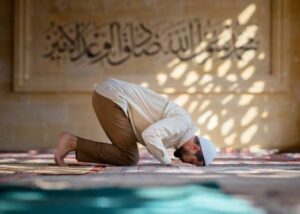Quran
Hadith
Islamic Text
Praise be to Allah, and His Salutations and Peace be upon our Master Muhammad ﷺ, his believers and his Companions:
It is permitted to combine prayers in the Shafi’i School; Żuhr with ‘Aṣr (and vice versa) and Maghrib with ‘Ishā’ (and vice versa), but only in particular circumstances.
Imam Muslim (no. 702) reports on the authority of ‘Abd-Allah b. ‘Abbas, may Allah be Pleased with them both:
عَنِ ابْنِ عَبَّاسٍ، قَالَ جَمَعَ رَسُولُ اللَّهِ صلى الله عليه وسلم بَيْنَ الظُّهْرِ وَالْعَصْرِ وَالْمَغْرِبِ وَالْعِشَاءِ بِالْمَدِينَةِ فِي غَيْرِ خَوْفٍ وَلاَ مَطَرٍ . فِي حَدِيثِ وَكِيعٍ قَالَ قُلْتُ لاِبْنِ عَبَّاسٍ لِمَ فَعَلَ ذَلِكَ قَالَ كَىْ لاَ يُحْرِجَ أُمَّتَهُ . وَفِي حَدِيثِ أَبِي مُعَاوِيَةَ قِيلَ لاِبْنِ عَبَّاسٍ مَا أَرَادَ إِلَى ذَلِكَ قَالَ أَرَادَ أَنْ لاَ يُحْرِجَ أُمَّتَهُ
”Ibn ‘Abbas reported that the Messenger of Allah ﷺ combined the noon prayer with the afternoon prayer and the sunset prayer with the ‘Isha’ prayer in Medina without being in a state of danger or rainfall. And in the hadith transmitted by Waki’ (the words are): “I said to Ibn ‘Abbas: What prompted him to do that? He said: So that his (Prophet’s) Ummah should not be put to (unnecessary) hardship.” And in the hadith transmitted by Mu’awiya (the words are):” It was said to Ibn ‘Abbas: What did he intend thereby? He said he wanted that his Ummah should not be put to unnecessary hardship.“
This sound hadith highlights the actions of the Prophet ﷺ in combining prayers which shows that combining prayers is permitted, although due to other narrations and principles, the scholars stipulate that this is only permitted in certain instances, and not open to individual choice.
In the Shafi’i school, it is only permitted to combine the aforementioned prayers due to travel or rain. Some of the scholars in the Shafi’i school have also mentioned that it is permitted to combine due to illness, but this opinion is not the position of the Shafi’i school. Rather, it is the opinion of some Shafi’i scholars and it is strong. Imam Ahmad bin Raslan ar-Ramli [d.844] says in Ṣafwat’uz-Zubad:
وجاز أن يجمع بين العصرين في وقت أحدى ذين كالعشاءين
كما يجوز الجمع للمقيم لمطر لكن مع التقديم
………
في مرض قول جلي وقوي اختاره حمد ويحيى النووي
“It is permitted to combine between the two ‘Asr prayers, in the time of one of them as is true for the two ‘Isha prayers.
It is also permitted to combine for the resident, due to rain, but only by way of taqdīm.
……..
Combining due to illness is a strong opinion, adopted by Hamd and Yahya an-Nawawi.”
The above details illustrate that combining Żuhr with ‘Aṣr (and vice versa) and Maghrib with ‘Ishā’ (and vice versa) is permissible, but only in particular circumstances.
In terms of details on the method of combining, there are many details a person will need to know; therefore, it is advised that the person who wishes to adopt combining prayers due to particular circumstances studies this in detail, or asks a scholar of the school that permits combining between prayers.
And Allah and His Messenger ﷺ know best.
– Shaykh Mohammed Jamili (2nd Dhul’Qa’dah 1443 | Madinah Munawwarah)
See also:
When is it permitted to combine prayers?
Respecting difference of opinion
See also (video):






